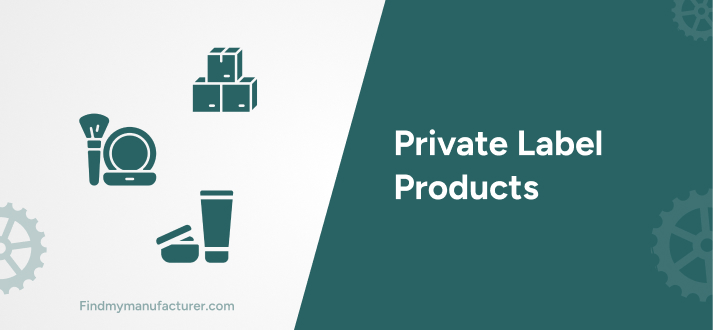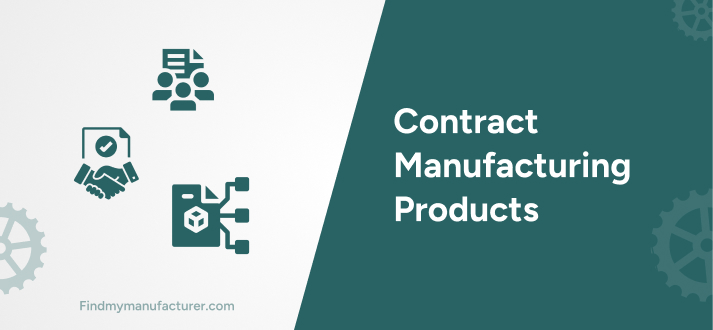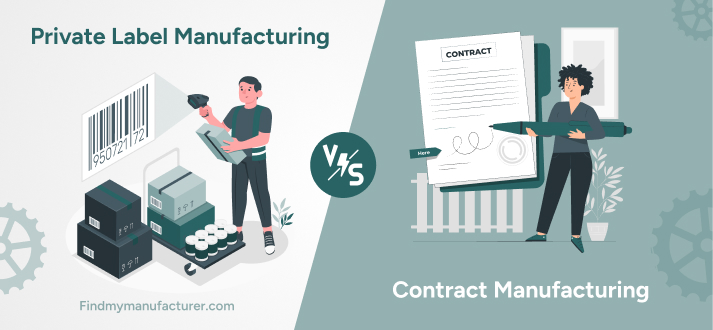In the world of product manufacturing and retail, two common business models stand out: private label manufacturing and contract manufacturing. Both play crucial roles in bringing products to the market, but they differ significantly in terms of brand ownership, control, and overall business structure. In this article, we’ll delve into the key differences between private label manufacturers and contract manufacturers to help businesses understand which model aligns better with their goals.
Private Label Manufacturing
Private label manufacturing is a business arrangement where a retailer or reseller partners with a manufacturer to produce goods under the retailer’s brand name. In this model, the retailer dictates the product specifications, branding, and packaging, effectively allowing them to customize the product to cater to their target market.
Key Characteristics of Private Label Manufacturing
Brand Ownership:
- In a private label arrangement, a retailer or reseller sources products from a manufacturer but sells them under their brand name. The manufacturer produces the product according to the specifications provided by the retailer.
Customization:
- The retailer can customize the product to meet specific market demands, including packaging design, features, and formulations.
Risk and Investment:
- The retailer focuses on branding, marketing, and distribution, often without the need for significant investments in manufacturing facilities.
Market Presence:
- Private-label manufacturing allows retailers to establish a presence in the market without the complexities of in-house manufacturing.
Flexibility:
- Offers more flexibility in terms of branding, marketing, and product changes as the retailer has more control over these aspects.
Contract Manufacturing
In contrast, contract manufacturing involves a company hiring a manufacturer to produce goods on their behalf. The hiring company retains ownership of the brand and product specifications but relies on the manufacturing expertise of the contractor. This model is particularly attractive for businesses looking to reduce capital investment in manufacturing.
Key Characteristics of Contract Manufacturing
Brand Ownership:
- In a contract manufacturing arrangement, the company hiring the manufacturer retains ownership of the brand. The manufacturer is responsible for producing the product based on the specifications provided by the hiring company.
Product Customization:
- While the hiring company can specify product requirements, the degree of customization may vary based on the capabilities of the contract manufacturer.
Risk and Investment:
- The hiring company may need to invest in product development, marketing, and distribution, but the actual manufacturing process is managed by the contract manufacturer.
Market Presence:
- Contract manufacturing allows companies to focus on branding and marketing while leveraging the manufacturing expertise of a specialized partner.
Flexibility:
- Offers flexibility in terms of manufacturing capabilities, allowing the hiring company to focus on other aspects of the business.
Having explored the fundamental differences between private label vs contract manufacturing, it is essential to delve further into the specific products commonly linked with these collaborative arrangements. Private label manufacturing, characterized by retailers partnering with manufacturers to produce goods under their brand, often finds application in cosmetics and beauty products, food and beverages, and clothing and apparel. This model allows retailers to tailor products to their brand image and target market. On the other hand, contract manufacturing, where a company outsources production while retaining brand ownership, is prevalent in industries such as electronics and technology for gadgets like smartphones, pharmaceuticals for generic drugs and medical devices, and automotive for specific components. Examining these product examples provides valuable insights into the diverse applications of private label and contract manufacturing across various sectors.
Private Label Product Examples

Cosmetics and Beauty Products:
- Retailers in the beauty industry often collaborate with manufacturers to create private label cosmetics, skincare, and hair care products. The retailer can customize formulations, packaging, and branding to appeal to their specific customer base.
Food and Beverages:
- Supermarkets and grocery chains frequently use private label manufacturing for food and beverage products. This includes items like cereals, snacks, and beverages, where retailers can design packaging and control the product’s quality to align with their brand image.
Clothing and Apparel:
- Private label manufacturing extends to the fashion industry, where retailers work with manufacturers to produce clothing lines under their brand. This allows for unique designs, materials, and branding, giving retailers a competitive edge.
Read our recent blog: Top 10 Benefits of Private Label Products
Contract Manufacturing Product Examples

Electronics and Technology Products:
- Companies in the electronics sector often opt for contract manufacturing to produce items like smartphones, tablets, and other tech gadgets. The hiring company provides design specifications, and the contract manufacturer handles the production process.
Pharmaceuticals and Medical Devices:
- The pharmaceutical industry frequently utilizes contract manufacturing for the production of generic drugs and medical devices. The hiring company maintains control over the product’s formulation and quality while relying on the expertise of the contract manufacturer for efficient production.
Automotive Components:
- Automotive companies may engage contract manufacturers for the production of specific components or accessories. This allows the hiring company to focus on design, marketing, and distribution, leaving the manufacturing expertise to the contractor.
Conclusion
In conclusion, the choice of private label vs contract manufacturing depends on the specific goals, resources, and preferences of the businesses involved. Private label manufacturing offers greater control over branding and customization, while contract manufacturing provides a cost-effective solution for companies looking to streamline production processes and reduce capital investment. Understanding the differences between contract manufacturing and private label is crucial for businesses seeking to establish a successful and efficient manufacturing strategy in today’s competitive market.
Businesses seeking optimal partnerships with contract and private label manufacturers are turning to innovative platforms like Find My Manufacturer. This platform serves as a catalyst, connecting businesses with leading manufacturers, and streamlining the search for suitable collaborators. By leveraging the comprehensive database and networking capabilities of Find My Manufacturer, companies can efficiently navigate the intricate decision-making process. Whether in the realm of cosmetics, food, electronics, or beyond, businesses can tap into a diverse array of manufacturing expertise, fostering collaborations that align with their unique needs and objectives. Through platforms like Find My Manufacturer, the journey to discovering and engaging with top-tier private label and contract manufacturers is streamlined, empowering businesses to thrive in an increasingly competitive and dynamic market.
